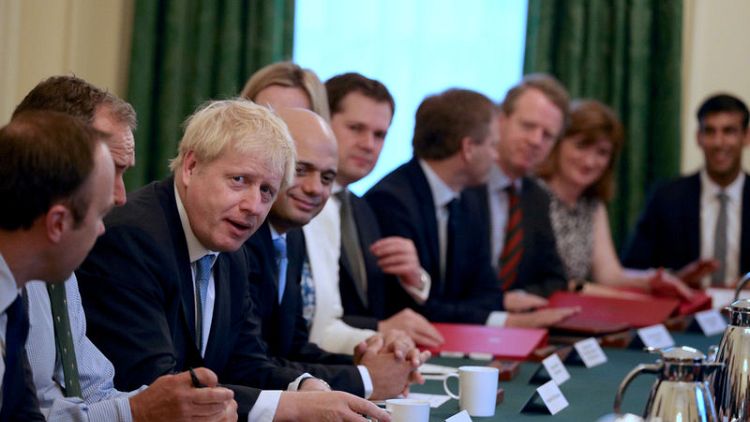By Andy Bruce
LONDON (Reuters) - Rarely has Britain's economic outlook been so unclear for a new prime minister as it is for Boris Johnson, with strengths such as the lowest unemployment in 44 years contrasting with signs in business surveys of a slowdown or even a recession.
More than three years into the Brexit crisis, Britain's economy probably slowed to a standstill in the April-June period and might even have contracted for the first time since 2012, economists say.
At least part of the weakness can be attributed to a hangover from a stockpiling boom in the run-up to the original Brexit date of March 29, when companies brought forward work to get ready for possible disruption.
But there are other suggestions of more underlying problems.
Below are some important gauges of the health of the world's fifth-biggest economy.
BUSINESS INVESTMENT
Business investment has flat-lined since the Conservative Party won the 2015 general election with a pledge to hold a referendum on membership of the European Union. That ended a rise which began after the financial crisis of 2008/09.
The malaise looks likely to continue as companies assess the risk that Britain leaves the EU on Oct. 31 without a deal, something Johnson has said he is prepared to do if he cannot strike a new agreement with the bloc.
GRAPHIC: UK business investment - https://tmsnrt.rs/2y8zEmP
JOBS
On the face of it, the labour market is the strongest part of Britain's economy. The unemployment rate is the lowest since the three months to January 1975 and pay is rising at the fastest rate in a decade.
But there are also signs of weakness emerging. Employment growth slowed sharply in the three months to May and self-employment accounted for all the jobs added. The number of employees fell by the largest amount since 2011.
GRAPHIC: Signs of slowing in UK jobs market - https://tmsnrt.rs/2Md2ACD
ECONOMIC GROWTH
Official data showed strong growth of 0.5% in the first quarter from the last three months of 2018, fuelled by the stockpiling boom.
The hangover from that rush and earlier-than-usual closures of auto plants in April, also linked to the March 29 Brexit deadline, mean gross domestic product probably showed zero growth or shrank in the second quarter.
Official GDP data is due on Aug. 9 but business surveys published recently have painted a picture of an economy struggling for momentum.
The closely watched IHS Markit/CIPS survey of the services sector is deep into territory associated in the past with interest rate cuts by the Bank of England.
GRAPHIC: UK economy stalling - PMI - https://tmsnrt.rs/2MbbgcD
GOVERNMENT FINANCES
The new finance minister is under less immediate pressure to fix the public finances than his most recent predecessors but he will have only limited resources to boost government spending or cut taxes, as promised by Johnson in his leadership campaign.
Britain's headline measure of total government debt stands at more than 1.6 trillion pounds ($2.0 trillion), equivalent to 75% of economic output, down only slightly from historic peacetime highs of more than 80% a few years ago.
Britain's budget deficit has shrunk to just over 1% of GDP in the last financial year from nearly 10% a decade ago, but official budget forecasters predicted in March that it will rise again this year.
That forecast did not take into account the higher spending and tax cuts pledged by Johnson during his campaign, nor the hit to the public finances that would follow a no-deal Brexit.
GRAPHIC: UK public finances - https://tmsnrt.rs/2OeFspO
HOUSING MARKET
The housing market slowed after the 2016 Brexit vote, especially in London where house prices fell at the fastest rate since the financial crisis in the 12 months to May, according to official data.
But there are signs that the worst of the slowdown may have passed.
The Royal Institution of Chartered Surveyors says the housing market showed tentative signs of recovery in June as interest among buyers rose for the first time since just after the Brexit referendum, and sales also staged a rare increase.
GRAPHIC: Signs of a rebound in UK housing market? - https://tmsnrt.rs/2ycHBrs
(Graphics by Andy Bruce; Editing by Peter Graff)



